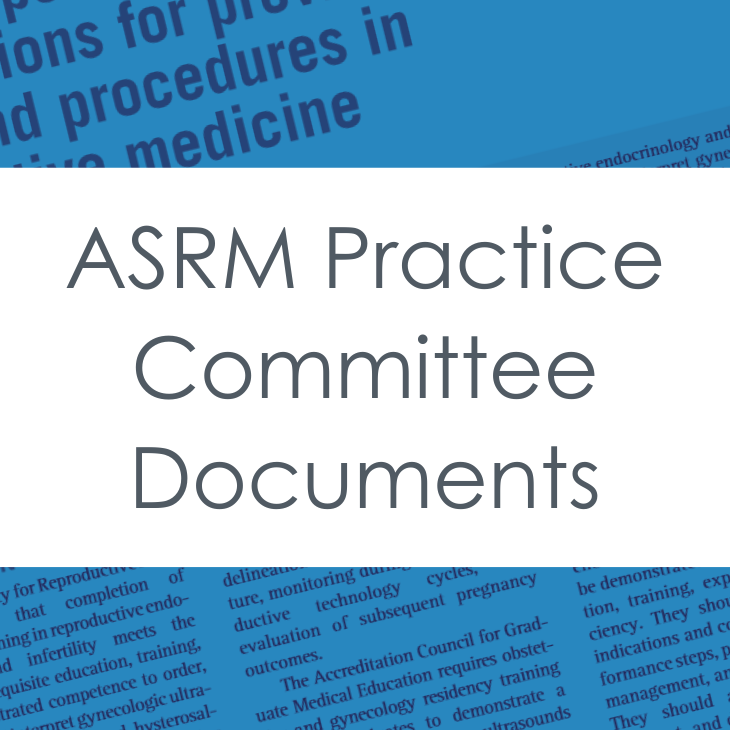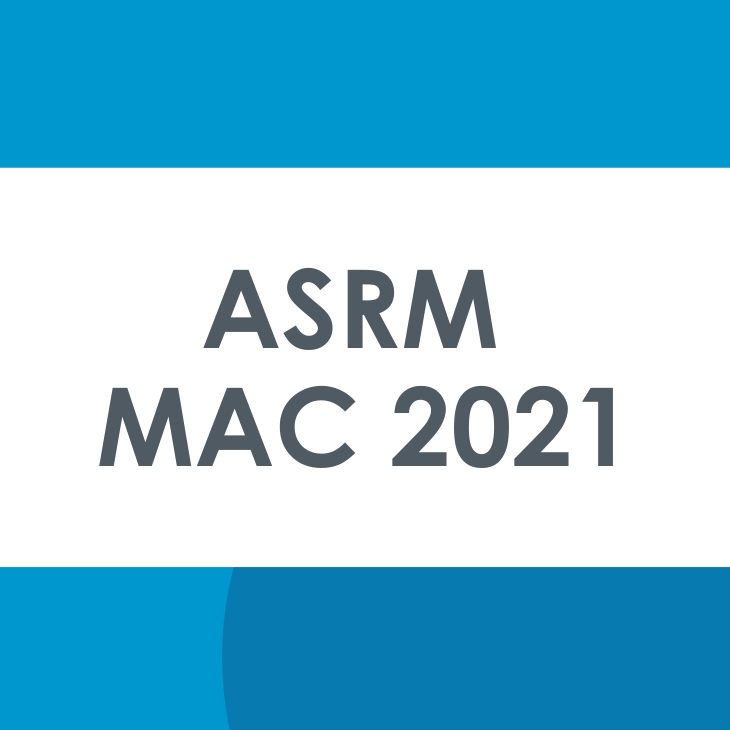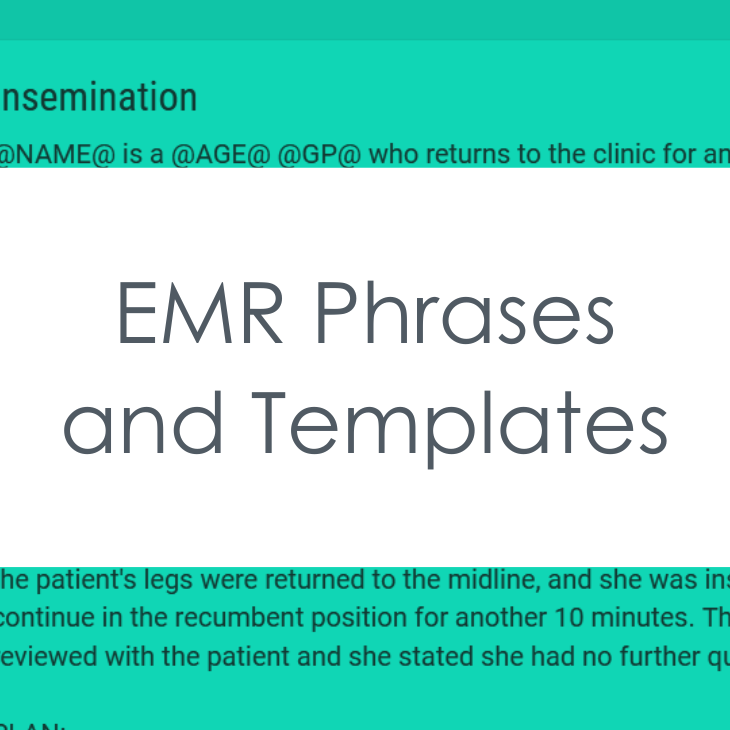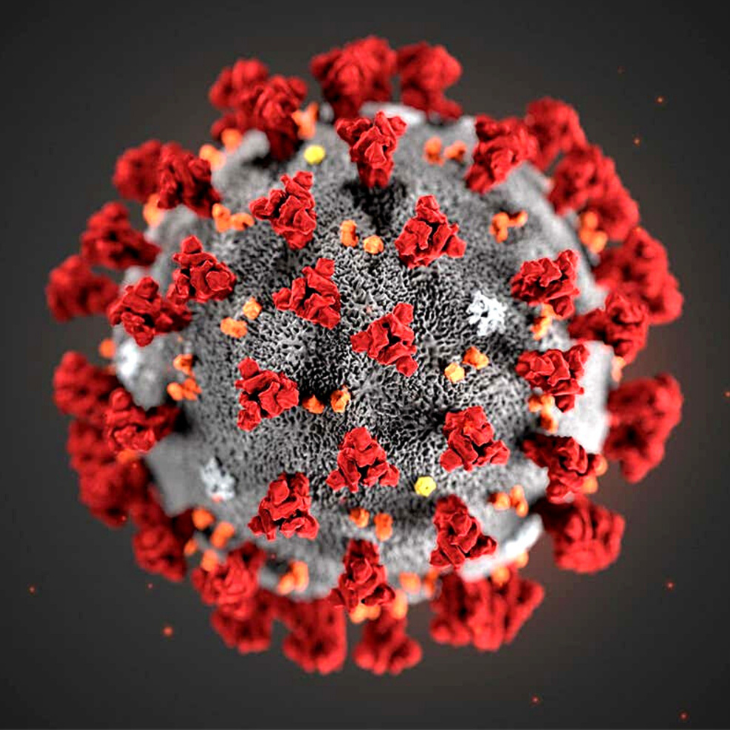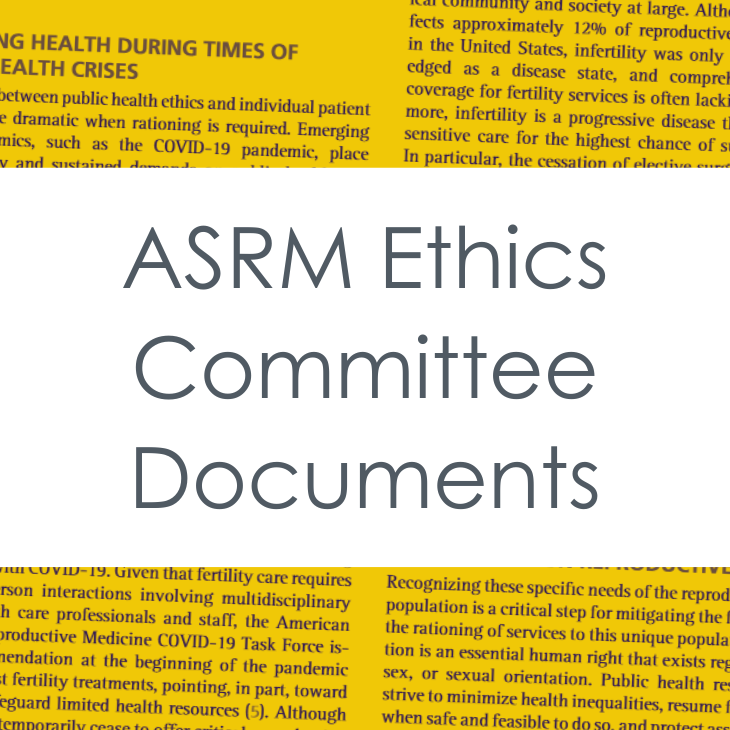
Disclosure of sex when incidentally revealed as part of preimplantation genetic testing (PGT): an Ethics Committee opinion
Clinics may develop a policy to disallow selecting which embryos to transfer based on sex and choose to use only embryo quality as selection criteria. Clinics may also develop a policy to use randomization to select those embryos for transfer if more embryos suitable for transfer are available than can be transferred. (Fertil Steril® 2018;110:625–7. ©2018 by American Society for Reproductive Medicine.)
KEY POINTS
- Clinics should develop policies regarding identification and disclosure of sex when preimplantation genetic testing (PGT) is performed with a primary medical goal and should disclose these policies to prospective patients.
- Patients should be informed that the sex of resulting embryos may be known as part of the embryo testing process and asked whether they wish to receive this information.
- Clinics should have nondiscrimination policies and should inform patients of these policies; for example, if a clinic had a policy of transferring only male embryos or transferring only female embryos, this policy would be discriminatory and unethical.
- Clinics may have policies disallowing consideration of the sex of the embryos as a factor in selecting which embryos to transfer, choosing to use only embryo quality as selection criteria. If more embryos suitable for transfer are available than can be transferred, clinics may have a policy of using randomization to select those embryos that will be transferred. Clinics should inform patients of these policies prior to initiating treatment.
BACKGROUND
Preimplantation genetic testing for aneuploidy (PGT-A) and preimplantation genetic testing for structural rearrangements (PGT-SR) are increasingly performed as a method for determining the genetic and chromosomal make up of early embryos. Such testing may be useful as clinics are moving toward the goal of single-embryo transfer to avoid multiple births. PGT-A and PGT-SR are often used with the primary medical goal of optimizing pregnancy and live birth rates through the detection of aneuploidy, translocations, and other chromosomal abnormalities. PGT-A differs from preimplantation genetic testing for monogenic disease (PGTM) in that generally the number of sex chromosomes are reported in PGT-A while generally not reported in PGT-M, which looks for a specific disease-causing gene. However, many labs that perform PGT-M for single-gene disorders also routinely screen for aneuploidy in addition to testing for the presence or absence of the specific disease causing gene. This document will use the general term PGT to encompass all forms of preimplantation genetic testing. These techniques have moved beyond screening for single-gene diseases such as cystic fibrosis that are not sex-linked and hemophilia that are sex-linked. Depending on the testing that is done, PGT may or may not reveal embryo sex.The ASRM Ethics Committee has taken the position that clinics may differ ethically from each other in the policies they adopt about the use of PGT for nonmedical sex selection (1). This opinion leaves open the question whether clinics also may differ ethically in their policies regarding disclosure and use of sex if available in determining which embryos to transfer when PGT is performed for medical reasons.
Some parents undergoing assisted reproductive technology (ART) and PGT for medical reasons may wish to know the sex of embryos. Other parents may not—just as some patients request not to know the sex of the fetus after chorionic villus sampling (CVS) or amniocentesis. Other parents may wish to take advantage of their need for PGT for medical reasons in order to try to select the sex of their prospective child. In some instances, PGT test results will contain information about the sex of embryos; in other instances—such as when results are simply reported as ‘‘normal’’—sex will not be revealed as part of the lab findings. Clinics are strongly encouraged to inform patients in advance of testing about the protocol their reference laboratory follows as to the revelation of an embryo's sex if available in reported test results.
When PGT is performed for medical reasons and sex is reported by the lab, knowledge of sex may be a finding that was not the intended object of inquiry. There has been considerable recent discussion of the ethical and legal issues raised by the return of such findings that were not the intended object of inquiry in both research and clinical care, including the terminology to be used to refer to them. The American College of Medical Genetics and Genomics (ACMG) recommends pretest counseling to discuss with patients the possibility of these ‘‘secondary’’ findings and their implications (2). In a 2013 policy document, the ACMG recommended against disclosing a list of secondary findings of clinical importance (3), and that the list be updated on a regular basis (3). Because of the potential clinical importance of the secondary findings, the recommendation of the policy document was not limited based on the age of the patient; however, the initial ACMG recommendation against a ‘‘right not to know’’ was controversial (4–6). Discussions in Europe regarding the possibility of consensus are ongoing (7). A later clarification by the ACMG indicated that laboratory reports should include the secondary findings to the ordering clinician, who could then discuss them with the patient in light of the patient's preferences (8). The ACMG reiterated the judgment that reporting results for children was in their best interest, for addressing their own health conditions or potential serious health conditions in their parents (8). The clarification emphasized that the recommendation was limited to genetic variations of known significance for which clinical intervention is available (8). A still later update of the recommendations included an opt-out possibility for patients who so choose at the time the sample is collected for analysis (9). In addition, the American Society of Human Genetics has recently revisited its 1995 statement recommending deferral of testing for adult-onset conditions until adulthood. The new statement recommends encouraging parents to defer such predictive testing until adulthood or at least until older adolescence to allow the child to participate in the decision thoughtfully (10). These discussions of the return of secondary findings of medical significance for both children and adults continue to evolve. Ethical discussions have also begun to address return of findings of variants of unknown significance and findings of social but not clinical significance such as misattributed parentage (11–13); and these discussions continue to evolve as well.
ETHICAL CONSIDERATIONS
The ASRM Ethics Committee opinion concerning PGT for nonmedical sex selection (14) emphasizes these ethical values: parental autonomy and reproductive liberty; best interests of the child; potential medical risks of the procedure; and justice, including both nondiscrimination and costs of the procedure. Some of these ethical considerations take different form when PGT is undertaken for medical reasons. When sex is a secondary finding, costs and risks of the procedure are not additional factors as they are already incurred for the initial testing. However, autonomy and reproductive liberty, best interests of the child, and justice in the sense of nondiscrimination remain ethical concerns.Patients have autonomy interests in the knowledge they wish (or do not wish) to receive (15). These autonomy interests led the ACMG to revise its recommendations on return of clinically significant results to include an opt-out possibility at the time samples are collected (9). Recognition of this autonomy interest in information is important for patients undergoing ART, as discussed in the ASRM committee opinion concerning PGT for nonmedical sex selection (1). In the case of PGT for medical reasons, the patient's primary goal is to avoid disease in their offspring. Supporters of patient autonomy argue that when test results reveal the sex of the embryo as part of the laboratory findings, patients are entitled to know this information upon request. Once informed, some patients may seek to direct transfer based on an embryo's sex. In instances where such selection is unrelated to the health status of the embryo, such a request for transfer mirrors that of sex selection for nonmedical reasons. The ASRM Ethics Committee has stated that ART practices are free to offer or decline to offer nonmedical sex selection techniques, so long as they do so in a nondiscriminatory manner and provide notice of their adopted policy to patients. Clinic policies governing the provision of nonmedical sex selection can be applied in instances when sex is revealed incident to PGT, but no medical reasons exist for preferring one sex over another. If clinics have policies that do not permit considering the sex of embryos in making decisions about which embryos to transfer, patients may choose to seek care elsewhere. Information about clinic policies is essential to enable patients to make informed decisions about whether and where to pursue ART treatment.
On the other side, patients also have rights ‘‘not to know,’’ especially if the information is not of immediate clinical significance (9, 14). If patients request clinics not to give them information about an embryo's sex, this decision also ought to be respected. Patients should be informed, however, that an embryo's sex could be a part of the patient's report and might be disclosed inadvertently.
Clinics, however, should not substitute their own decisions about the desirable sex of offspring for patients. For example, it would be unethical for a clinic to have a policy to always transfer embryos of one sex or the other, or always transfer embryos to balance the sex of children within families. Clinics should have nondiscriminatory policies with respect to embryo selection, such as policies based on embryo quality or randomization.
As the ASRM Ethics Committee opinion on sex selection for nonmedical reasons recognized, the best interests of offspring are also an important consideration (1). Clinic policies addressing decisions about embryo transfer must respect these interests. This includes following appropriate medical guidelines about the number and quality of embryos to select for transfer (16). Offspring interests can also be considered by counseling patients to guard against imposing gender stereotypes on their children (1). If patients are undergoing PGT for medical reasons, and sex is a secondary finding, it is possible that gender stereotypes may play a less important role for them than for parents seeking PGT with sex selection as the primary goal. Nonetheless, it is important for clinics to be aware of this possibility and to ensure that their policies are nondiscriminatory.
Considerations of social justice are also implicated when patients seek to select the sex of their offspring for nonmedical reasons (1). However, when patients are undergoing ART for medical reasons, and embryo sex is a secondary finding, it is unlikely that providing patients with information about embryo sex will have broader social consequences, even in small social subgroups. Nonetheless, as the ASRM Ethics Committee opinion on sex selection for nonmedical reasons concludes, clinics should counsel patients to guard against decisions that result from inappropriate pressure from family members or others.
CONCLUSION
When patients undergo ART and PGT for medical reasons, embryo sex could be a common secondary finding. Patients should be informed of this possibility before undergoing PGT. Patients have the right to information about an embryo's sex, as well as the right to request not to be given this information. Clinics may have policies not to take an embryo's sex into account in making transfer decisions. Clinics must have nondiscrimination policies regarding embryo transfer when the sex of the embryo is known. Patients should be informed about these policies.
Acknowledgments:
This report was developed by the Ethics Committee of the American Society for Reproductive Medicine as a service to its members and other practicing clinicians. While this document reflects the views of members of that Committee, it is not intended to be the only approved standard of practice or to dictate an exclusive course of treatment in all cases. This report was approved by the Ethics Committee of the American Society for Reproductive Medicine and the Board of Directors of the American Society for Reproductive Medicine.This document was reviewed by ASRM members and their input was considered in the preparation of the final document. The following members of the ASRM Ethics Committee participated in the development of this document. All Committee members disclosed commercial and financial relationships with manufacturers or distributors of goods or services used to treat patients. Members of the Committee who were found to have conflicts of interest based on the relationships disclosed did not participate in the discussion or development of this document.
Judith Daar, J.D.; Jean Benward, L.C.S.W.; Lee Rubin Collins, J.D.; Joseph B. Davis, D.O.; Owen Davis, M.D.; Leslie Francis, J.D., Ph.D.; Elena Gates, M.D.; Elizabeth Ginsburg, M.D.; Sigal Klipstein, M.D.; Barbara Koenig, Ph.D.; Laurence McCullough, Ph.D.; Richard Paulson, M.D.; Richard Reindollar, M.D.; Ginny Ryan, M.D.; Mark Sauer, M.D.; Sean Tipton, M.A.; Lynn Westphal, M.D.; Julianne Zweifel, Ph.D.
REFERENCES
- Ethics Committee of the American Society for Reproductive Medicine. Use of reproductive technology for sex selection for nonmedical reasons. Fertil Steril 2015;103:1418–22.
- ACMG Board of Directors. Points to consider in the clinical application of genomic sequencing. Genet Med 2012;14:759–61.
- Kalia SS, Adelman K, Bale SJ, Chung WK, Eng C, Evans JP, et al. Recommendations for reporting of secondary findings in clinical exome and genome sequencing, 2016 update (ACMG SF v2.0): a policy statement of the American College of Medical Genetics and Genomics. Genet Med 2017;19:249–55.
- Knoppers BM. Introduction: from the right to know to the right not to know. J L Med Ethics 2014;42:6–10.
- Burke W, Antommaria AH, Bennett R, Botkin J, Clayton EW, Henderson GE, et al. Recommendations for returning genomic incidental findings? We need to talk! Genet Med 2013;15:10.
- Wolf SM, Annas GJ, Elias S. Point-counterpoint. Patient autonomy and incidental findings in clinical genomics. Science 2013;340:1049–50.
- Hehir-Kwa JY, Claustres M, Hastings RJ, van Ravenswaaij-Arts C, Christenhusz G, Genuardi M, et al. Towards a European consensus for reporting incidental findings during clinical NGS testing. Eur J Hum Genet 2015;23:1601–6.
- American College of Medical Genetics and Genomics. Incidental findings in clinical genomics: a clarification. Genets Med 2013;15:664–6.
- American College of Medical Genetics and Genomics. ACMG updates recommendation on ‘‘opt out’’ for genome sequencing return of results. Available at: https://www.acmg.net/docs/Release_ACMGUpdatesRecommendations_ final.pdf. Accessed December 1, 2016.
- Botkin JR, Belmont JW, Berg JS, Berkman BE, Bombard Y, Holm IA, et al. Points to consider: ethical, legal, and psychosocial implications of genetic testing in children and adolescents. Am J Hum Genet 2015;97:6–21.
- Holm IA. Clinical management of pediatric genomic testing. Curr Genet Med Rep 2014;2:212–5.
- Hardart GE, Chung WK. Genetic testing of children for diseases that have onset in adulthood: the limits of family interests. Pediatrics 2014;134(Suppl2):S104–10.
- 13. Mandava A, Millum J, Berkman BE. When should genome researchers disclose misattributed parentage? Hastings Cent Rep 2015;45:28–36.
- Ethics Committee of the American Society for Reproductive Medicine. Use of reproductive technology for sex selection for nonmedical purposes. Fertil Steril 2015;103:1418–22.
- Viberg J, Segerdahl P, Langenskiöld S, Hansson MG. Freedom of choice about incidental findings can frustrate participants' true preferences. Bioethics 2015;30:203–9.
- Practice Committee of the American Society for Reproductive Medicine. Guidance on the limits to the number of embryos to transfer: a committee opinion. Fertil Steril 2017;107:901–3.
Topic Resources
View more on the topic of genetic screening/testing
Ethics Opinions
Ethics Committee Reports are drafted by the members of the ASRM Ethics Committee on the tough ethical dilemmas of reproductive medicine.

Assisted reproduction with advancing paternal and maternal age: an Ethics Committee opinion (2025)
Explore ethical considerations in assisted reproduction for older parents, balancing reproductive autonomy with potential offspring well-being.
Disclosure of medical errors and untoward events involving gametes and embryos: an Ethics Committee opinion (2024)
Medical providers have an ethical duty to disclose clinically significant errors involving gametes and embryos.
Use of preimplantation genetic testing for monogenic adult-onset conditions: an Ethics Committee opinion (2024)
Preimplantation genetic testing for adult-onset monogenic diseases is ethically allowed when fully penetrant or conferring disease predisposition.

